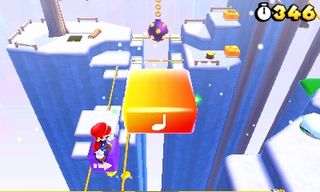So, both Joe Danger games have been announced for the PlayStation Vita. That’s good news, right? After all, both are excellent, funny, smart, infuriatingly demanding games, packed with as many ideas as they can possibly cram into convenient bite-sized chunks of gameplay, a minute or two at a time. As such, they’re a perfect fit for the Vita.
But there’s a problem here. Because there’s another, increasingly troubling connotation to the notion of ‘a perfect fit for the Vita’. As it develops as a platform, it increasingly feels like games like Joe Danger are becoming a standard fit for Sony’s well-meaning but put-upon handheld in ways beyond the suitability of their gameplay mechanics. Culturally, the Vita is becoming defined not as a worthwhile platform in its own right, but as a dumping ground for old games and ports.

In a lot of ways, Vita has now escaped its troubled, early period as gaming’s most soundly thrashed handheld whipping boy. No longer is it that over-priced, over-specced, gameless handheld, cared about by precisely no-one. Its price is now reasonable. It has a few respectable exclusives either out or on the way, and those higher-than-necessary hardware specifications are now finally seeing its wider library filled with a fairly steady stream of rather decent ports of ‘big’ console games.
But is that entirely a good thing? After all, a console’s worth is defined not by the breadth of its line-up, but by the unique system-sellers amongst that line-up; the killer apps that give the format its personality, brand values, and exclusive appeal. You buy into a console for the games you can’t get anywhere else, and you use the multiformat games to fill in the gaps between exclusive releases. A console needs a healthy balance of both in order to be a really exciting prospect. Tip it too far to either side, and you have problems.
In a way, the Vita is an interesting parallel to Nintendo’s similarly struggling Wii U. Both formats are having difficulty carving out their own niche within the gaming landscape, despite their respective companies’ claims of uniqueness. Both have a handful of genuinely great, first-party exclusives, all too often tragically overlooked by the mainstream gaming masses (see Tearaway’s miserable North American launch window sales of 14,000 for evidence of this on Vita). And where the Wii U is now almost entirely a first-party machine in terms of software, Vita’s increasing non-Sony library is struggling to provide what I see as meaningful third-party support.

The 3DS started out with similar problems to the Vita, of course. A lack of compelling games, with a lengthy wait between big hitters, and far too high a hardware retail price all combined to make for a pretty sad launch window. But since then, a strong Nintendo line-up has been bolstered by staunch support from third-parties with a consistent string of unique, new games that can only be played on the 3DS. The Wii U only has half of that equation locked down of course, and while Vita’s extended line-up is now making up the numbers, I don’t really see that it’s making up the value.
It seems telling that Sony’s new push for the Vita is not so much about the system’s games, but about its services and tertiary uses as a device. PS4 remote play and the manifold delights of the PS Plus Instant Game Collection are the order of the day. While the latter of those may initially seem to be a selling point aimed squarely at game value, I actually see it as potentially being detrimental to Vita’s future prospects for third-party exclusives. By spoiling Vita owners with free games every month, surely PS Plus is also creating a culture of ‘Wait and see’, cutting launch window sales as gamers stick it out and wait for a PS Plus release a few months down the line. That kind of behaviour can’t be a great incentive for developers to pour resources into the brand new, exclusive games that the Vita so badly needs, and so ports continue to be the console’s standard release model.

While remote play gives Vita a fancy new role to play in the next generation of home consoles, surely it also makes those ported games even less valuable to a consumer. After all, why buy Gearbox’s upcoming conversion of Borderlands 2 when you can pick up the (probably shinier) PS3 version dirt cheap and stream it to your Vita whenever you want? The lack of distinction between Vita games and those available on other PlayStations is not helping it at all, and remote play only emphasises the problem.
Even indie games, the third prong of Sony’s current attempt at a Vita renaissance, runs into the same problem. There are some incredible-looking indie games coming along for the Vita, but again, few genuine exclusives. Most will be available for the PC, PS3 or PS4 at the same time

Now I’m not writing off Vita’s chances here. The promising fact is that a lot of the problems I’ve mentioned above come as flip-sides to some very pleasant aspects of the Vita indeed. Between mass indie support, remote play, and a steady stream of free, playable incentives to own the machine, Vita potentially has a lot going for it. Indeed, the regular trips to the PS Store required by those PS Plus bonuses alone could give a definite boost to the discoverability of some of Vita’s other gems. But all of this stuff needs to become a warm, inviting blanket wrapped around the kind of unique, system-selling exclusives that any console needs.
Hopefully, Sony’s promotion of the Vita’s tertiary functions is just the current stage of a long-term plan. If it can use Vita’s versatile charms to build a bigger install base, and the exposure of PS Plus to cultivate a receptive audience for smaller and mid-tier studios’ later games, then there’s a very bright and appealing future ahead for both player and developer alike. We could currently be witnessing the sowing of very fertile ground for a stronger, exclusive, future Vita line-up. But Sony need to keep its eyes on that long-term goal, and not allow Vita’s identity as a unique games machine be diluted along the way.

